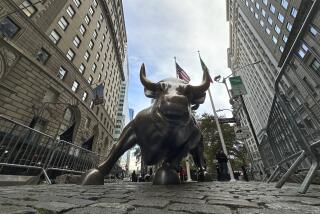Stocks Extend Losing Streak
Chronic economic worries stifled Wall Street’s attempt at a rebound Thursday, despite falling oil prices and modest but better-than-expected retail sales reports.
The blue-chip Dow Jones industrial average and the broad Standard & Poor’s 500 index were down for the fourth day in a row, their longest losing streaks in months, while the Nasdaq notched its third straight decline. The S&P; 500 is on track for one of its worst weeks of the year.
Wall Street’s pain rippled around the globe, with the Mexican market down 3%, Brazil falling 3.1%, Japan sinking 2.4% and France down 1.3%.
General Electric, a widely held Dow Jones component closely watched on Wall Street, said it was on track for another strong quarter and increased its stock buyback program. Encouraging sales at Wal-Mart Stores and other retailers also helped the market post early gains.
But the market, which had started the day higher, retreated sharply after Dallas Fed President Richard Fisher reiterated his belief that inflation was near the top of the Fed’s comfort zone. Some investors also awaited today’s U.S. employment report, which is expected to detail job losses from the hurricanes.
Those concerns prompted investors to abandon some of the market’s more popular holdings, pushing stocks lower through the session. A continued drop-off in oil prices caused a sell-off in the high-flying energy sector, and small-cap and technology stocks also suffered as investors moved into larger, more established companies.
“This is certainly not bad, with retail sales OK and oil falling, but there’s still a lot of uncertainty out there,” said Joseph Battipaglia, chief investment officer at Ryan Beck & Co. “You’ve still got an erosion in consumer confidence that could lead to a serious erosion in consumer spending, at the same time you have the [Federal Reserve] still hiking interest rates. It’s a hard market to buy into.”
The market regained some of its losses in the last half-hour of trading. The Dow ended down 30.26 points, or 0.3%, to 10,287.10, adding to a loss of 218.12 points over the previous two sessions.
The tech-focused Nasdaq composite index dropped 18.94 points, or 0.9%, to 2,084.08, and the S&P; 500 lost 4.90 points, or 0.4%, to 1,191.49.
Almost two stocks fell for every one that rose on the New York Stock Exchange. Trading was heavy.
U.S. Treasury yields also rose, as falling crude oil and gasoline prices tempered speculation that high energy costs would curb consumer spending and slow inflation. The yield on the 10-year Treasury note rose to 4.39% from 4.35% on Wednesday.
Crude oil, continuing its slide, fell $1.43 to $61.36 a barrel in New York trading. Wall Street, however, seemed more focused on employment losses in the wake of hurricanes Katrina and Rita.
First-time unemployment claims rose to 390,000 last week, an increase of 21,000 from the previous week. The storms’ effect on payrolls will be further illuminated today after the Labor Department releases its monthly job report.
Economists expect a net loss of 129,000 to more than 172,000 jobs for September, with the hurricanes’ disruptions partly offset by jobs created elsewhere.
In other markets highlights:
* General Electric, seen as a barometer of the overall economy because of its media, industrial and healthcare businesses, pleased investors with its steady profit outlook. The company also added $1 billion to its stock buyback program. GE gained 91 cents to $33.59.
“We need more companies to come out and tell us that they’re going to be OK,” said Jeff Kleintop, chief investment strategist for PNC Financial Services Group in Philadelphia. “That will help dispel this kind of fog we’re in right now, because I think despite the warnings we’ve had from some of these companies, we’ll have good earnings this quarter.”
* Wall Street was also heartened by retail sales reports, which mostly showed modest gains despite the economic disruptions along the Gulf Coast. Wal-Mart rose 43 cents to $43.93 after the retailer said its sales for stores open at least a year rose 3.8%, in line with expectations.
Rival discounter Target topped Wall Street’s expectations with a 5.6% jump in September same-store sales, while department store chain J.C. Penney reported a 1.4% increase in sales for the month and raised its earnings forecast for the current quarter.
Target added 78 cents to $52.02, while J.C. Penney dropped 38 cents to $44.59, giving up earlier gains.
Discount retailer Costco Wholesale climbed $2.01 to $44.92 after posting a 20% rise in profit that beat Wall Street’s expectations by 2 cents a share.
* In the energy sector, Exxon Mobil lost 38 cents to $58.57, Chevron slid $2.04 to $60 and Valero Energy fell $2.73 to $103.04, all on heavy volume.
* Amgen shares fell 2.6% amid concerns about the No. 1 biotechnology company’s upcoming quarterly earnings report and overall weakness in the sector. Amgen’s shares dropped $2.05 to $75.96.
* Technology shares were also weak. Intel, the world’s No. 1 semiconductor maker, fell 31 cents to $23.76 and Broadcom sank $1.46 to $45.89.
Check Point Software Technologies, a maker of computer-security software, sank $2.20 to $21.50. It said third-quarter revenue would be $140 million to $141.5 million, at the bottom of a July prediction of $140 million to $150 million. Check Point also agreed to buy closely held Sourcefire Inc. for $225 million.
Reuters and Bloomberg News were used in compiling this report.
More to Read
Inside the business of entertainment
The Wide Shot brings you news, analysis and insights on everything from streaming wars to production — and what it all means for the future.
You may occasionally receive promotional content from the Los Angeles Times.










